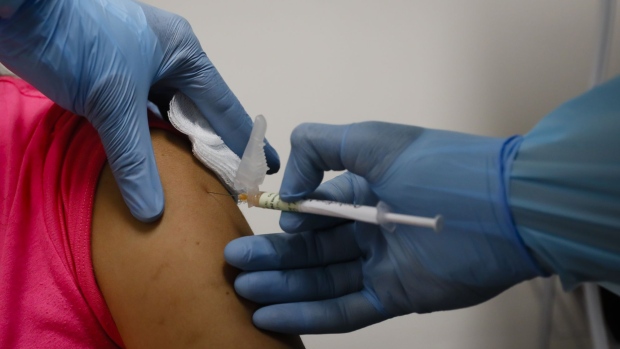Oct 27, 2020
Pfizer COVID vaccine trial hasn't reached analysis milestone
, Bloomberg News

Pfizer Inc. indicated that a large, late-stage trial of its experimental coronavirus vaccine hadn’t yet reached a key milestone that will help researchers determine how well it protects people from COVID-19.
In a presentation included with its third-quarter earnings results Tuesday, the drugmaker said the data-monitoring board of scientists overseeing the trial hadn’t yet conducted an interim efficacy analysis. That means fewer than 32 cases of COVID-19 have occured among the trial’s participants. The first of four efficacy analyses is scheduled to be conducted when the trial achieves that threshold.
Pfizer has enrolled more than 42,000 patients in its COVID-19 vaccine trial. Almost 36,000 have received their second dose as of Oct. 26, the company said Tuesday.
As one of the front-runners in the race for a coronavirus vaccine, Pfizer had said it could have initial efficacy results as soon as this month. Some analysts had wondered whether an interim analysis might already have been conducted and not reported, perhaps because it hadn’t shown conclusive results.
Pfizer is developing the vaccine with German partner BioNTech SE.
Shares of Pfizer were down 0.3 per cent in premarket trading in New York. Through the close on Monday, the stock had declined 3.2 per cent so far this year.
At the same time, Pfizer narrowed its profit forecast for the year, saying that it now expects adjusted earnings per share of US$2.88 to US$2.93, compared with US$2.85 to US$2.95 previously. In the third quarter, revenue fell 4.3 per cent from a year earlier to US$12.13 billion, as demand for some of its top drugs was reduced by COVID-19.
The company said that its third-quarter sales were reduced by US$500 million, or four per cent, due to COVID-19 related impacts, including reductions in wellness visits in the U.S. and lower demand for certain products in China. Sales in its Upjohn business, which sells many of its older drugs like cholesterol fighter Lipitor, were down 18 per cent from a year earlier.
Sales of the smoking-cessation drug Chantix, down 19 per cent in the U.S., were particularly impacted by the decline in wellness visits domestically, while in China there was lower demand for certain anti-infective products because of fewer elective surgeries and improved infection control compared to last year.
Partly offsetting the COVID-19 impact, some patients caught up on missed doses of the Prevnar-13 vaccine in third quarter.




